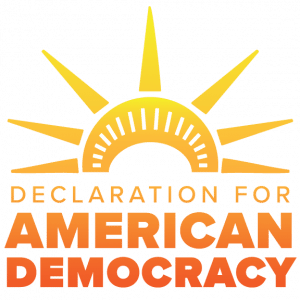This Week in 200 Words
In state updates, Massachusetts governor Charlie Baker signed a campaign finance law that will make campaign spending more transparent to the public. Two Massachusetts Senate candidates have signed the People’s Pledge to restrict third-party funding in their campaigns. A federal appeals court considers overturning Mississippi’s felon disenfranchisement laws. Ohio lawmakers are considering a bill to make voter registration automatic at the BMV. Michigan rolled out its new online voter registration service. Vermont’s capital city passed a resolution to adopt ranked choice voting in its elections.
In other news, Pennsylvania’s recent voting system malfunction highlights the importance of backup paper ballots for election security in 2020. The House is expected to vote this week on the Voting Rights Advancement Act of 2019, which would strengthen voting rights against racial discrimination. Election security could be jeopardized in 2020 by a wave of retirement among election officials. The influence of dark money involved in Supreme Court appointments is growing. And a new article highlights how a grassroots campaign of Michigan activists was the driving force behind the state’s recent gerrymandering reforms that strip redistricting power from legislators.
National News
Washington Post – The Cybersecurity 202: Pennsylvania voting debacle gives ammunition to paper ballot push
Massive voting machine failures in a Pennsylvania county in November are giving election security advocates fresh ammunition to call for nationwide paper ballots.
The problems, which may have been caused by a software glitch, resulted in some Northampton County residents who tried to vote straight-ticket Democrat initially registering as straight-ticket Republican. It also incorrectly showed a Republican judicial candidate winning by a nearly statistically impossible margin, the New York Times’ Nick Corasaniti reports.
In this case, voters got lucky. The county had paper backups for all the votes the machine counted incorrectly. They showed the Democrat judicial candidate Abe Kassis — who the computer tally said got just 164 votes out of 55,000 ballots — actually narrowly won the race.
But about 16 million Americans spread across eight states won’t have a paper backup for their votes in 2020. That means a similar software glitch or a malicious hack by Russia or another U.S. adversary could cause mass uncertainty about an election’s outcome or even result in the wrong candidate taking office.
The Guardian – Republicans tried to rig the vote in Michigan – but ‘political novices’ just defeated them
In 2016, Katie Fahey, a Michigan woman with no political experience, put up a Facebook post asking if anyone she knew wanted to do something about gerrymandering, a pervasive practice of lawmakers drawing district lines to benefit their own party.
[…] Fahey’s post would create a movement that could provide a roadmap for making US elections fairer. Coordinating over Google Docs and fanning out across the state, her effort grew into a group called Voters Not Politicians that would eventually amend the Michigan constitution to strip redistricting power from lawmakers.
NPR – As 2020 Approaches, Some Experienced Election Officials Head To The Exits
Between possible foreign interference, potentially record-high turnout, new voting equipment in many parts of the country and what could be a razor-close outcome, the 2020 election was already shaping up to be one of the most challenging elections to administer in U.S. history.
On top of those challenges, a number of top election officials who oversaw voting in 2016 won’t be around next year. Some are retiring after long careers, but others are feeling the strain of an increasingly demanding and politicized job.
Just Security – With Supreme Court Mired in Dark Money, Time for a Large Dose of Transparency
The Washington Post revealed earlier this year a sprawling network of organizations that is funded by at least a quarter-billion dollars of largely anonymous money and is spearheaded by the Federalist Society’s Leonard Leo. This network played a big role in the confirmations of Justices Neil Gorsuch and Brett Kavanaugh. One anonymous donor gave $17 million to the Leo-affiliated Judicial Crisis Network for political campaigns against Judge Merrick Garland and in favor of Gorsuch; then came another $17 million for the political campaign to prop up Kavanaugh, perhaps from the same donor.
That would mean someone spent $35 million to influence the composition of the Supreme Court. Presumably, they’d expect results.
State Updates
Massachusetts – 97.9 WHAV – Gov. Baker Signs DiZoglio-Backed Campaign Finance Reform
Sen. Diana DiZoglio says a revised campaign finance law, signed this week by Gov. Charlie Baker, will help state officials identify discrepancies between candidates’ income and spending and their bank records.
The depository reporting system, operated by the independent Office of Campaign and Political Finance, directs candidates for public office to submit to “stringent campaign finance reporting requirements,” a statement from DiZoglio’s office said. Previously, the legislature and some mayoral candidates were exempt from using this reporting system.
Massachusetts – Joe Kennedy and Shannon Liss-Riordan signed a People’s Pledge. Ed Markey is proposing something different.
Mississippi – San Diego Tribune – Federal court hears felon voting rights case in Mississippi
A federal appeals court hears arguments Tuesday on the constitutionality of Mississippi laws that permanently bar certain felons from voting unless they can get their rights restored through what advocates say is a difficult process.
Six convicted felons are pushing to have their voting rights restored through a lawsuit filed in federal court in Mississippi. They have argued that the restrictions imposed in 1890 were designed to “permanently disenfranchise black voters.”
“For every crime on the list there is a similar or even worse crime not on the list. Check fraud means permanent disenfranchisement. But credit card fraud carries no similar penalty,” the [Cato Institute] argued. “By disenfranchising individuals for minor crimes, Mississippi drastically departs from the States that understand permanent disenfranchisement for what it is — among the most severe penalties our society can inflict.”
Ohio – Local12 – State lawmakers considering bill that would make registering to vote automatic at BMV
Registering to vote in Ohio could soon become a lot easier. State lawmakers are considering making the process automatic when you get a driver’s license or any other ID from the BMV. Some lawmakers say the current system is antiquated and this would be a simple way to make the voting rolls more accurate and make it easier for people to vote.
A bipartisan bill would automate the registration process. It would require the BMV to take the information it gets and update voter registrations. The League of Women Voters says 90 percent of eligible voters will go to the BMV for some kind of ID.
Michigan – ClickonDetroit – Benson announces beginning of online voter registration and availability of eNotary services in Michigan
Secretary of State Jocelyn Benson announced on Cyber Monday that Michiganders can now register to vote or update their voter registration online.
The secure, web-based online voter registration tool is available to citizens with a valid Michigan driver’s license or state ID card. Michigan residents without these documents can learn more about how they can register to vote by visiting the site. All other methods of voter registration, including registration by mail, will remain available. Michigan also began implementing automatic voter registration in September as part of driver’s license and state ID card transactions.
“This fast, convenient, cost-effective and secure option to register to vote will enable many more people to participate in democracy, and help Michigan’s clerks maintain complete, accurate and up-to-date voter rolls,” said Secretary Benson.
Vermont – WCAX – City Council passes ranked-choice voting
At Monday night’s meeting, city council voted 9 to 3 to pass resolution that seeks to adopt ranked choice voting in all mayoral, city councilor and school commissioner elections. In ranked choice voting, voters would get to rank the candidates on the ballot based on preference instead of having to choose between two top candidates.
Councilors in support of ranked choice voting argue it is better for both voters and candidates than the current system that they say puts third party candidates at a disadvantage and forces voters to cast their ballot for someone just to keep another out of office.

